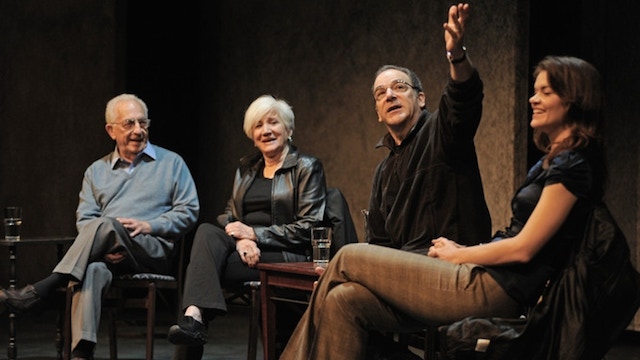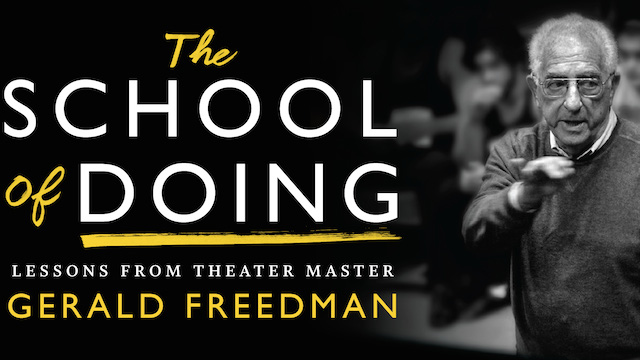This November East Hampton native Isaac Klein is releasing his first book, The School of Doing: Lessons from theater master Gerald Freedman. The tribute to the theater legend includes contributions from many of Gerald’s well-known students and collaborators – like Kevin Kline, Patti LuPone, Christine Baranski, Mandy Patinkin, Chita Rivera, Anna Camp, Dane DeHaan, and Billy Magnussen – and was funded on Kickstarter in just eight days.
We recently caught up with Klein about the crowdfunding process, Gerald, and more.
What inspired the book?
IK: Gerald was the greatest teacher I’ve ever had. I think I first got inspired because when I graduated, which was 11 years ago now, I put together a packet that was a few pages long of quotes of his that I had taken in my notes. He really loved it and felt like it was this great summation of a lot of the training and he started handing it out to his students who came after me. I thought, oh, wow, I have some sort of knack for taking the words of this great teaching and picking what’s useful to him. He also said when he was looking at it, “I don’t remember saying this.” He does so much of it in the moment it doesn’t always stay with him. So having me write it down and map it out, I thought doing a more extended version of that could be exciting. It was an idea that we talked about for quite a few years before we actually started it.
For those unfamiliar with Gerald Freedman, could you please share a bit about his history?
IK: He had a huge role in the American theater in the 20th century. He started out as a young man working under contract at Columbia Pictures and Hollywood, and at the same time, working for the legendary director and choreographer Jerome Robbins, assistant directing the original productions of Gypsy and West Side Story, among others. At the same time, he was doing his own work. He did a lot of Shakespeare and he started to work with Bernie Gersten and Joe Papp and became the artistic director of the New York Shakespeare Festival, which is now known as Shakespeare in the Park, where he worked for years and years. And with Joe Papp and Bernie Gersten, he founded the Public Theater and directed their inaugural production, which was the world premiere of Hair, the beloved musical. He was artistic director at several theaters, including the Great Lakes Theater in Cleveland, and was the first American invited to direct at the Globe Theatre in London. He’s had an international, wonderful career and then when he was in his 60s, in the earlier 90s, after having had done some teaching over the years at places like Northwestern and Yale and Juilliard, he felt inspired to really start to focus his energies and efforts on the training of the artists and he became the Dean of the University of North Carolina School of the Arts, where he was for 21 years when he retired. That’s where I met him and where he was my teacher and trained me.
 |
|
Gerald Freedman, Olympia Dukakis, Mandy Patinkin, and Missi Pyle. (Courtesy Photo) |
How involved with the book was Gerald?
IK: He was very involved. What I thought we might do to create the book at first was to talk about each subject together and I thought, oh, I’ll record that and write it out and that will be the book. But, it ended up not being that simple. First off, he experienced a series of strokes in 2011 and had what I’d describe as a relatively strong recovery and he just celebrated his 90th birthday and is having a really nice quality of life. After the strokes, which were about six years ago now, he’s been hindered by aphasia, so it’s harder for him to speak the same way as he did before, and as I was describing, it’s not that he was always remembering what he said, even in his prime. He’s still engaged and brilliant and helping the student to find these things.
I realized just recording and talking about it – that was not going to get us the best stuff. So I went back through all of these archives and recordings and tapes and articles and transcripts and kind of wove a draft together based on all the things I could find there and I spent months over the 4 1/2 year process that it took to write the book with Gerald in his home in North Carolina going over everything I found, going over my drafts. I was really thrilled that we could share an editing and refining process, where he would sometimes say, “Oh, that’s not quite what I mean by that.” Or, “Cut that,” or “Put that over there.” So it was great to be very involved with him as we put together the book from what I was finding.
How did you decide which of Gerald’s students and collaborators to reach out to?
IK: That was actually really tough. There are still quite a few people who I think, oh, it would have been so great to talk to them. But, I had to draw the line somewhere. I spoke to 130 people. Because he’s touched and inspired so many people the list is endless. There were some people that were no-brainers because they are beloved institutions of the theater. There was no way I was not going to reach out to Chita Rivera, Patti LuPone, Kevin Kline, and Mandy Patinkin, and Hal Holbrook – that was easy. And then a lot of how I figured it out was I worked really closely on that with Robert Beseda, who I would say has been Gerald’s best friend for the last 25 years, and they along with some other folks, ran the department together. Robert was the Assistant Dean of the school. He’s kind of the primary person looking out for Gerald and helping him with things in the world now and has an extensive knowledge of who Gerald worked with and where and who was most important to him. He helped me to try to put together a cross section of a diverse group of people from different places, old and young, from over the years and different areas of his life and work, and as we proceeded we would think of more people and say, “Oh how could we have not have thought of them before. Let’s try to get them.” Eventually, as the timelines shortened and the list of people we had spoken with grew, we decided to start drawing the line a little bit more.
What was the most important thing you learned from Gerald?
IK: There’s so many things and I’m happy that so many of them, I hope, are clearly laid out in the book. The school of doing has a lot of interpretations, but ultimately it’s about really doing things. I think the most powerful lesson that I really apply to everything is that if you really do the work, if you really investigate, if you really put the time in, and stay open, there’s very little that is not possible. If you really work for it, you can achieve almost anything, and that sounds almost cliché now that I’m saying it, but in the actual application of it, to really learn and embrace that and incorporate that in your life takes more than just repeating that phrase. He really walked that walk and worked tirelessly for that school. There would be times where we would say, as students, “We’re exhausted. How can we be working this hard?” And there would be this man in his 80s with boundless energy, working harder than any of us to make this happen and that pushed us and kept us going and no one could really complain then. That’s one aspect of it I’ll pick, but it’s a very hard choice to make.
 |
|
The School of Doing: Lessons from theater master Gerald Freedman is Klein’s first book.
|
Why did you decide that Kickstarter was the way to go in terms of funding the project?
IK: Once I decided I wanted to self-publish, I really then wanted to get the word out and I know there are a lot of people who love Gerald and who will be excited that there is a place where as many teachings as possible are collected. I thought that there would be enough people excited about the book that I would be able to fund it through that community, which I am very grateful that I was – even more quickly and abundantly than I hoped. It was a way to gather the funds I need and do an initial promotion and pre-orders for the book, in a matter of speaking. Now there’s something I can point to that not only shows what I think of the great summary of the project and what it’s about, but also that there is clearly a community that is excited about the book being in the world.
And now that you’ve reached your goal, you’re also hoping to fund a book tour.
IK: I was overwhelmed and delighted to reach our goal in just eight days. I really thought I would need to work hard to get there. Now that we’re in this place where there is this additional amount of support that’s out there, I would love the opportunity to take the book to different cities and have events there and hopefully have some noteworthy contributors to the book there with me and talk about how Gerald has influenced us and look at some different sections of the book and what they’re about and share ideas of these great teaching with more people.
Growing up on the East End, what’s the theater scene like?
IK: I had a wonderful experience. I felt very fortunate as somebody who was very passionate about theater from a young age that there really were consistent outlets for me. That’s thanks to a handful of people. There was Jacqui Leader with Kids Connect that I did a lot of plays with and Helene Leonard with Stages, who I must have done 20 or 30 plays with her. There’s nice arts programming at Springs School, which I went through and did all the plays I could, as well as East Hampton High School, and Josh Gladstone and Kate Mueth and all the people at Guild Hall also helped keep me out of trouble. So, there was quite a bit to see and be involved with consistently, pretty much throughout the year. I’m grateful now that I receive invitations to come back and engage with the community there and still have an artistic home there and share my work as a director and a writer and an actor with the East End community. I think pretty much every year I’ve gone back to do something where people I know have said, “Hey, we know you’re not half bad and have local housing. Why don’t you come out and do something?”
The School of Doing: Lessons from theater master Gerald Freedman‘s Kickstarter campaign ends on Tuesday, August 22.
To pre-order The School of Doing: Lessons from theater master Gerald Freedman or support the Kickstarter campaign, visit www.kickstarter.com. For more information, visit www.facebook.com.












